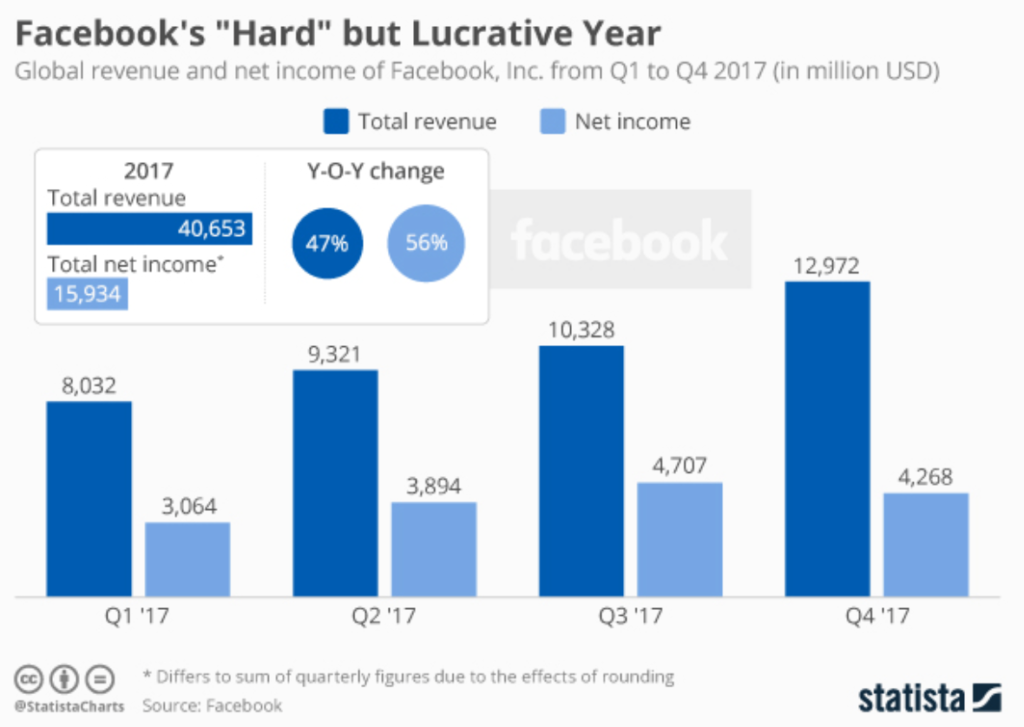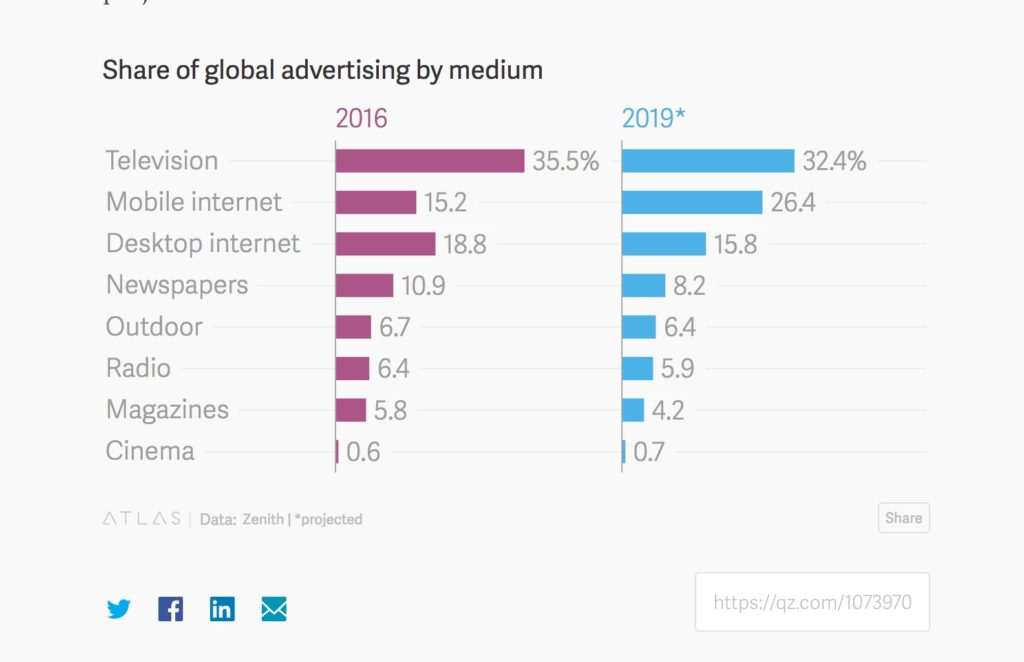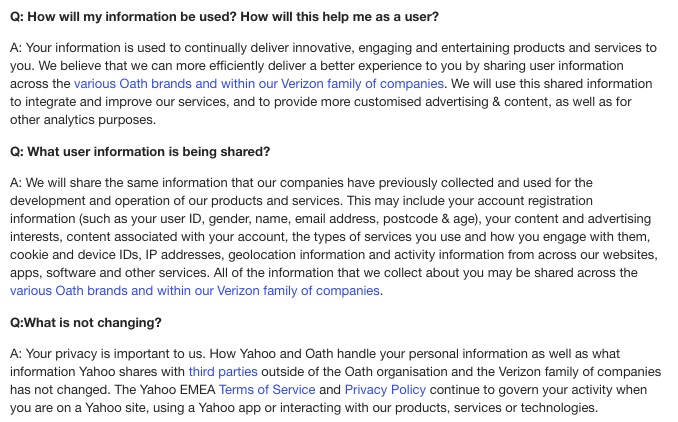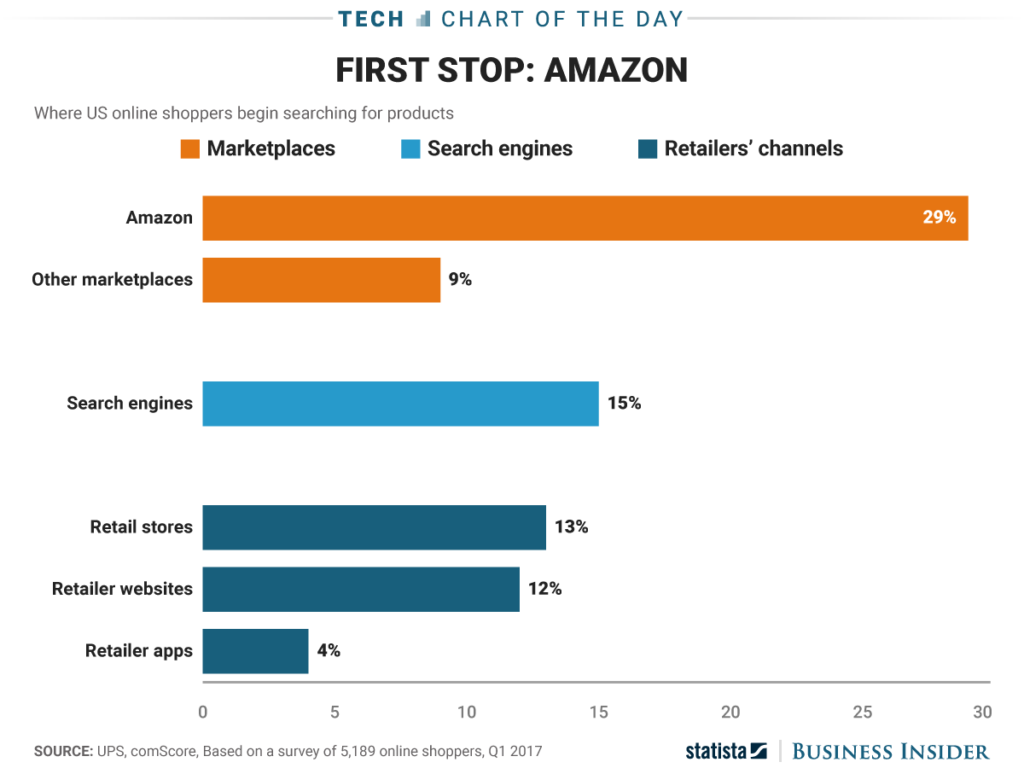Total revenue up 47%. Net income up 56%
Category Archives: Capitalism
Thinking ten years ahead
Ben Evans is one of the tech commentators I follow. This para from one of his blog posts struck me:
First, ecommerce, having grown more or less in a straight line for the past twenty years, is starting to reach the point that broad classes of retailer have real trouble. It’s useful to compare physical retail with newspapers, which face many of the same problems: a fixed cost base with falling revenues, the near-disappearance of a physical distribution advantage, and above all, unbundling and disaggregation. Everything bad that the internet did to media is probably going to happen to retailers. The tipping point might now be approaching, particularly in the US, where the situation is worsened by the fact that there is far more retail square footage per capita than in any other developed market. And when the store closes and you turn to shopping online (or are simply forced to, if enough physical retail goes away), you don’t buy all the same things, any more than you read all the same things when you took your media consumption online. When we went from a corner store to a department store, and then from a department store to big box retail, we didn’t all buy exactly the same things but in different places – we bought different things. If you go from buying soap powder in Wal-Mart based on brand and eye-level placement to telling Alexa ‘I need more soap’, some of your buying will look different.
The truth about advertising
Intellectual imperialism and the behavioural turn in economics
Further to the decision of the Nobel committee to give Richard Thaler this year’s prize for economics (about which I bloggeda few days ago), Frank Pasquale pointed me to an interesting critique by Juan Pablo Pardo-Guerra, who picks out “three problems in economics and its relation to the ‘real world’ it inhabits”.
Firstly, it skates over the fact that what Thaler is being rewarded for — realising “that people can be influenced by (mostly social) prompts to alter their behavior” — was, well, rather old-hat in other social science disciplines. So the Swedish recognition of behavioural economics is really just “a legitimation of economic imperialism: a finding is only truly relevant if published by an economist (corollary: being an economist from Chicago helps).” Ouch!
Secondly, though Thaler’s contribution might make economics “more human—and real”, the behavioural turn “doesn’t make away with the ontological commitments of discipline, privileging market processes and individual action as the fundamental sources of virtue.” Take the metaphor of the ‘nudge’, as articulated by Thaler and Sunstein. “Rather than questioning the economics of general equilibrium”, says Pardo-Guerra, “‘nudging’ is a proposal in calculated engineering: we can build policies that create outcomes similar to those of theory by gently walking slightly irrational, bounded economic agents through the correct ‘architectures of choice’”. But who conceptualises those architectures? And within what ideological constraints?
And finally, this year’s prize confirms that to win a Nobel prize in economics, it really helps to be male and white. To date, only one woman — Elinor Ostrom — has been recognised, and Amaryta Sen is the only non-white laureate so far. I don’t know much about the overall demographics of the economics discipline, but if the Nobel list is representative then one can see why it might be more problematic than the Swedes recognise.
MadMen 2.0: The anthropology of the political
Gillian Tett, who is now the US Editor of the Financial Times, was trained as an anthropologist (which may be one reason why she spotted the fishy world of Collateral Debt Obligations and other dodgy derivatives before specialists who covered the banking sector). She had some interesting reflections in last weekend’s FT about data-driven campaigning in the 2016 Presidential election.
These were based on visits she had paid to the data-mavens of the Trump and Clinton campaigns during the election, and came away with some revealing insights into how they had taken completely different views on what constituted ‘politics’.
“Until now”, she writes,
”whenever pollsters have been asked to do research on politics, they have generally focussed on the things that modern western society labels ‘political’ — such as voter registration, policy surveys, party affiliation, voting records, and so on”. Broadly speaking, this is the way Clinton’s data team viewed the electorate. They had a vast database based on past voting patterns, voter registration and affiliations that was much more comprehensive than anything the Trump crowd had. “But”, says Tett, “this database was backwards-looking and limited to ‘politics’”. And Clinton’s data scientists thought that politics began and ended with ‘politics’.
The Trump crowd (which seems mainly to have been Cambridge Analytica, a strange outfit that is part hype-machine and part applied-psychometrics), took a completely different approach. As one of their executives told Tett,
”Enabling somebody and encouraging somebody to go out and vote on a wet Wednesday morning is no different in my mind to persuading and encouraging somebody to move from one toothpaste brand to another.” The task was, he said, “about understanding what message is relevant to that person at that time when they are in that particular mindset”.
This goes to the heart of what happened, in a way. It turned out that a sophisticated machine built for targeting finely-calibrated commercial messages to particular consumers was also suitable for delivering calibrated political messages to targeted voters. And I suppose that shouldn’t have come as such a shock. After all, when TV first appeared, all of the expertise and resources of Madison Avenue’s “hidden persuaders” was brought to bear on political campaigning. So what we’re seeing now is just Mad Men 2.0.
How to be smart and clueless at the same time
Mark Zuckerberg’s ‘defence’ of Facebook’s role in the election of Trump provides a vivid demonstration of how someone can have a very high IQ and yet be completely clueless — as Zeynep Tufecki points out in a splendid NYT OpEd piece:
Mr. Zuckerberg’s preposterous defense of Facebook’s failure in the 2016 presidential campaign is a reminder of a structural asymmetry in American politics. It’s true that mainstream news outlets employ many liberals, and that this creates some systemic distortions in coverage (effects of trade policies on lower-income workers and the plight of rural America tend to be underreported, for example). But bias in the digital sphere is structurally different from that in mass media, and a lot more complicated than what programmers believe.
In a largely automated platform like Facebook, what matters most is not the political beliefs of the employees but the structures, algorithms and incentives they set up, as well as what oversight, if any, they employ to guard against deception, misinformation and illegitimate meddling. And the unfortunate truth is that by design, business model and algorithm, Facebook has made it easy for it to be weaponized to spread misinformation and fraudulent content. Sadly, this business model is also lucrative, especially during elections. Sheryl Sandberg, Facebook’s chief operating officer, called the 2016 election “a big deal in terms of ad spend” for the company, and it was. No wonder there has been increasing scrutiny of the platform.
Facebook meets irresistible force
Terrific blog post by Josh Marshall:
I believe what we’re seeing here is a convergence of two separate but highly charged news streams and political moments. On the one hand, you have the Russia probe, with all that is tied to that investigation. On another, you have the rising public backlash against Big Tech, the various threats it arguably poses and its outsized power in the American economy and American public life. A couple weeks ago, I wrote that after working with Google in various capacities for more than a decade I’d observed that Google is, institutionally, so accustomed to its customers actually being its products that when it gets into lines of business where its customers are really customers it really doesn’t know how to deal with them. There’s something comparable with Facebook.
Facebook is so accustomed to treating its ‘internal policies’ as though they were something like laws that they appear to have a sort of blind spot that prevents them from seeing how ridiculous their resistance sounds. To use the cliche, it feels like a real shark jumping moment. As someone recently observed, Facebook’s ‘internal policies’ are crafted to create the appearance of civic concerns for privacy, free speech, and other similar concerns. But they’re actually just a business model. Facebook’s ‘internal policies’ amount to a kind of Stepford Wives version of civic liberalism and speech and privacy rights, the outward form of the things preserved while the innards have been gutted and replaced by something entirely different, an aggressive and totalizing business model which in many ways turns these norms and values on their heads. More to the point, most people have the experience of Facebook’s ‘internal policies’ being meaningless in terms of protecting their speech or privacy or whatever as soon as they bump up against Facebook’s business model.
Spot on. Especially the Stepford Wives metaphor.
Corporate cant
Enter the GDPR
This morning’s Observer column:
Next year, 25 May looks like being a significant date. That’s because it’s the day that the European Union’s general data protection regulation (GDPR) comes into force. This may not seem like a big deal to you, but it’s a date that is already keeping many corporate executives awake at night. And for those who are still sleeping soundly, perhaps it would be worth checking that their organisations are ready for what’s coming down the line.
First things first. Unlike much of the legislation that emerges from Brussels, the GDPR is a regulation rather than a directive. This means that it becomes law in all EU countries at the same time; a directive, in contrast, allows each country to decide how its requirements are to be incorporated in national laws…
How things change
The €2.4B fine on Google handed down by the European Commission stemmed originally from complaints by shopping-comparison sites that changes in Google Shopping that the company introduced in 2008 had amounted to an abuse of its dominance in search. But 2008 was a long time ago in this racket, and shopping-comparison sites have become relatively small beer because Internet users researching possible purchases don’t start with a search engine any more. (Many of them start with Amazon, for example.)
This is deployed (by the Internet giants) as an argument for the futility of trying to regulate behaviour by dominant firms: the legal process of investigation takes so long that the eventual ruling is so out of date as to be meaningless.
This is a convenient argument, but the conclusion isn’t that we shouldn’t regulate these monsters. Nevertheless it is interesting to see how the product search scene has changed over time, as this chart shows.
The obvious solution to the time-lag problem is — as the Financial Times reported on January 3 — for regulators to have “powers to impose so-called “interim measures” that would order companies to stop suspected anti-competitive behaviour before a formal finding of wrongdoing had been reached.” At the moment the European Commission does have powers to impose such measures, but only if it can prove that a company is causing “irrevocable harm” — a pretty high threshold. The solution: lower the threshold.



